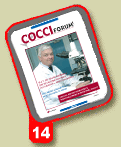
Other articles
in this issue
Future success for EU poultry companies requires focus on consumer trends, quality
Disease-control methods such as vaccination
and other tools that reduce
antibiotic usage and nurture the consumer’s
view of poultry meat as a safe,
high quality and socially conscious
product will contribute to the success
of European poultry companies in the
future, according to a leading poultry
consultant and strategist.
“Today’s consumer wants to know
what he eats, from where it came and
how it was produced. He wants assurance
that what he eats is safe for his
health and the environment, that it is
fair to the manpower that produced it
and that the meat comes from animals
that are well cared for and healthy,” said
Dr. Osler Desouzart, a Brazil-based
food-industry analyst who helps poultry
companies with marketing and
planning through his company OD
Consulting.
Desouzart noted that this trend is
particularly gaining strength in Europe.
“European producers should concentrate
in differentiated quality and new
values of the consumer, among which I
would say that regional and local values
are important. More and more, the
issue of ‘landen,’ ‘paeso,’ ‘terroir,’ ‘from
home’ is perceived by the consumer as
a value,” Desouzart added.
These trends are initiating changes
ranging from the use of more “natural”
diets in poultry feed to reduced housing
density for birds, he added, emphasizing
that poultry companies that
ignore “His Almighty Excellency, The
Consumer” will be doomed to fail.
Traits of successful companies

Desouzart: ‘European producers
should concentrate on
differentiated quality and
new values.’
During the course of his work,
Desouzart has found that the successful
poultry companies of today consider
quality an intrinsic value of the whole
company. They have a permanent
improvement system in place and are
never happy with the status quo. Their
strategy reflects where they want to be
in 10 years and provides a detailed,
quantified and dated plan for the next
3 years. They base decisions on data
and facts.
The primary focus of successful
poultry companies is on the consumer
rather than production. They have
“win-win” relationships with their
clients and suppliers, he said.
Granted, cutting costs is important,
but “creating value is essential,” he
said. A lower price does not necessarily
mean better value. Value goes handin-
hand with quality, which must start
at the beginning.
“A premium chicken sold at a premium
price cannot be made... with second-
grade feed, with the lots managed
by untrained people and with the ‘cost
dictatorship’ determining that the least
expensive ingredients should always
be used,” he said.
“Quality begins at the beginning,
but has to go all the way to the end.
There is no ‘partial’ quality, or quality
just in parts of the process, by part of
the departments and part of the time,”
Desouzart said.
‘Today’s consumer wants to know what
he eats, from where it came and how it
was produced. He wants assurance that
what he eats is safe for his health and
the environment’
“My point is that if European producers
try to fight the imports with their
unbeatable prices and tailor-made bulletproof
productions that resist any
quality assurance audit, they shall fail.
If they think that they can entrench
behind protectionism, they are
doomed.”
Desouzart said that marketing
“fresh” poultry might be one way to
compete, but he warned producers that
they should be prepared to fight again
in 20 years because it’s only a matter of
time before technology makes it possible
for foreign suppliers to sell fresh
poultry as well.
“The only thing that the invaders
cannot obtain is the level of marketing
knowledge and understanding that can
only come from working in that market,”
he said. “Furthermore, foreign
producers can’t claim that their product
is locally produced.”
Branding denotes confidence
*
‘Today’s consumer wants to know what
he eats, from where it came and how it
was produced. He wants assurance that
what he eats is safe for his health and
the environment’
Desouzart
Another trait common among successful
poultry companies is branding.
“There are no leaders without a brand,”
and to consumers, a brand denotes
confidence, assurance, reliability,
recognition, comfort, feeling at home
and safety, he said.
The basis for branding is “defined
and established quality.” Consumers
are prepared to pay for this personal
reassurance, “provided you do not forget
that ‘accessibility’ is a component of
quality,” Desouzart continued.
“A French consumer will argue for
days that a “poulet de Bresse” is superior
to any other broiler in the world,
even if you can induce him to error in
a blind test,” Desouzart explained. “But
why does he pay up to CHF 24,00 per
kg for the chicken produced in Bresse?
Because of its reputation, which dates
back to Louis XIV.
“So sell uniqueness and reputation,”
he added, “because wealthy consumers
are not buying meat or protein. Above
all, they are buying pleasure.”
Desouzart emphasized that while
positive connotations of a brand can
take decades to build, they can take
nanoseconds to be lost. “His Majesty
the consumer seldom forgets or forgives,”
he quipped.
Desouzart warned mainstream
European poultry producers to abandon
any notions they may have about
feeding the world’s hungry with lowcost
meat, which could lead to defeat
as underdeveloped countries increasingly
supply inexpensive poultry for
consumers in their countries.
Mainstream producers, Desouzart said,
need to stay focused on producing
quality meat with added value for local
markets.
In fact, “Your local market knowledge,
its idiosyncrasies and consumer
values may be the best ally that you
have to survive,” he said.
Source: Cocciforum issue 14





 © 2000 - 2021. Global Ag MediaNinguna parte de este sitio puede ser reproducida sin previa autorización.
© 2000 - 2021. Global Ag MediaNinguna parte de este sitio puede ser reproducida sin previa autorización.